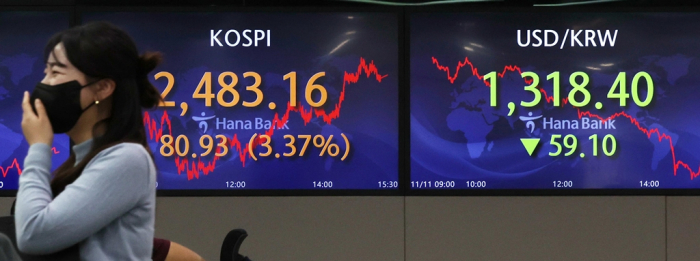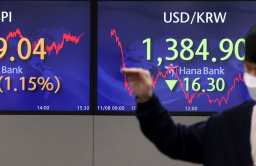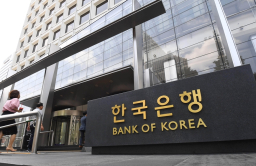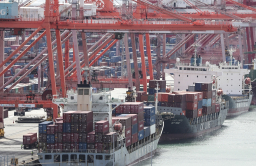-
KOSPI 2812.05 +41.21 +1.49%
-
KOSDAQ 756.23 +6.02 +0.80%
-
KOSPI200 376.54 +6.64 +1.80%
-
USD/KRW 1373 3.00 -0.22%
Korea won sees best day in nearly 14 yrs, may be climbing from bottom
Foreign exchange
Korea won sees best day in nearly 14 yrs, may be climbing from bottom
The won is more likely to appreciate further as easing US inflation may cause the Fed to ease up on interest rate hikes
Nov 11, 2022 (Gmt+09:00)
2
Min read
News+

The South Korean won currency on Friday reported the largest daily gain in almost 14 years as lower-than-expected US inflation data bolstered expectations that the Federal Reserve may slow its rate hike moves, boosting risk appetite in the global financial markets.
South Korea’s Finance Minister Choo Kyung-ho also said the government plans to take further measures to support the won, adding to views that the currency may have bottomed out despite sustained bearish factors such as the sluggish Chinese economy, the country’s top export market.
The won closed the local foreign exchange market up 4.5% at 1,318.4 per US dollar, marking the biggest daily gain since April 30, 2009. The local unit earlier appreciated to as firm as 1,312.5, its strongest since Aug. 17.
“The won is more likely to strengthen further although we still need to closely watch economic indicators and events such as the US PCE data and the Bank of Korea’s rate-setting meeting later this month,” said Kim Seung-hyuk, an analyst at NH Futures, referring to the US personal consumption expenditure price index.
The South Korean currency on Oct. 25 depreciated to as soft as 1,444.2, its weakest since the 2008-09 global financial crisis.
US inflation slowed to 7.7% in October, lower than a forecast of 8%, to hit the slowest level since January, data showed on Thursday. That raised hopes that the persistent inflation that has plagued the world’s top economy is showing glimmers of cooling, adding to predictions that the Fed will increase interest rates by less in December than in recent meetings. The US central bank delivered a fourth straight 75-basis-point rate hike earlier this month.
PANIC PURCHASES OF WON
After the inflation data, the dollar index, a measure of the greenback’s value against six major currencies, tumbled 2.5%, the largest decline since 2009. That spurred investors to unwind bearish bets on the won against the US currency.
The South Korean government plans to urge major public institutional investors to expand currency hedging of the existing foreign assets and adjust their overseas investment plans, Finance Minister Choo said, adding to the won’s strength.
South Korean stock markets also rallied on heavy foreign demand. Foreign investors bought a net 825.1 billion won ($623.7 million) in shares on the Kospi, helping the country’s main stock index end up 3.4%, according to Korea Exchange data. Offshore investors have purchased a combined net 3.1 trillion won on the main bourse so far this month, the data showed.
“The local stock markets are seeing active inflows of foreign money,” said Park Sang-hyun, an economist at HI Investment & Securities Co. “Some local banks and individual investors also scrambled for the won in panic.”
By Mi-Hyun Jo and Byung-Uk Do
mwise@hankyung.com
Jongwoo Cheon edited this article.
More To Read
-
Nov 03, 2022 (Gmt+09:00)
-
 Foreign exchangeKorea won hits 2-month high on US election, China hopes
Foreign exchangeKorea won hits 2-month high on US election, China hopesNov 09, 2022 (Gmt+09:00)
-
Sep 29, 2022 (Gmt+09:00)




